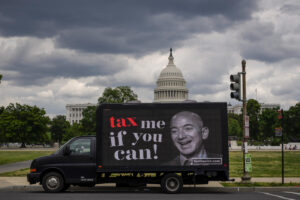At Extreme Investor Network, we strive to provide the most up-to-date and insightful information on all things finance. Today, we’re exploring President Biden’s plan to raise taxes on the wealthiest Americans, including Elon Musk and Jeff Bezos, as they accumulate massive untaxed wealth.
President Biden’s proposed “billionaire tax” aims to impose a minimum 25% tax on Americans with assets exceeding $100 million. This move is projected to affect around 10,700 of the wealthiest individuals in the country and generate an estimated $400 billion in revenue over the next decade.
While the idea of taxing the ultra-rich is not a new concept, Biden’s plan raises some important questions and challenges some fundamental principles of the current tax system. Experts point out that distinguishing between taxing earned income and wealth accumulation poses significant practical challenges.
To achieve a minimum 25% tax rate on the ultra-wealthy, Biden may need to tax unrealized gains, which are the profits from asset value increases that haven’t been realized through actual sales. This would mean redefining income calculation for billionaires, who often generate wealth through investments and stock growth rather than traditional wage income.
For example, Elon Musk’s wealth surged by nearly $12 billion between 2018 and 2023, but his reported income during that period was significantly lower. Biden’s proposed tax would have resulted in a much higher tax bill for Musk compared to what he paid under the current system.
However, implementing a wealth tax based on unrealized gains raises concerns about how to handle losses when asset values decline. This could create a complex and impractical system, as experts point out the challenges of taxing fluctuations in asset values.
While the idea of taxing the ultra-wealthy has garnered significant support among the public, some argue that the top 1% already contribute a substantial portion of federal tax revenue. Critics suggest that existing mechanisms, such as the Alternative Minimum Tax (AMT), could be updated to address concerns about taxing high incomes.
History also offers lessons on how steep wealth taxes can lead to unintended consequences. For instance, Norway saw a significant exodus of billionaires after implementing a capital asset tax. To avoid similar pitfalls, experts suggest starting with a lower tax rate on billionaires and learning from the experiences of other countries like Spain and Switzerland.
As the financial landscape evolves with new technologies and advancements, it’s crucial for the US tax system to adapt and stay relevant. At Extreme Investor Network, we keep you informed about the latest developments in finance and provide expert insights to help you navigate the complex world of investing and personal finance. Stay tuned for more updates and valuable resources to enhance your financial literacy and success.


